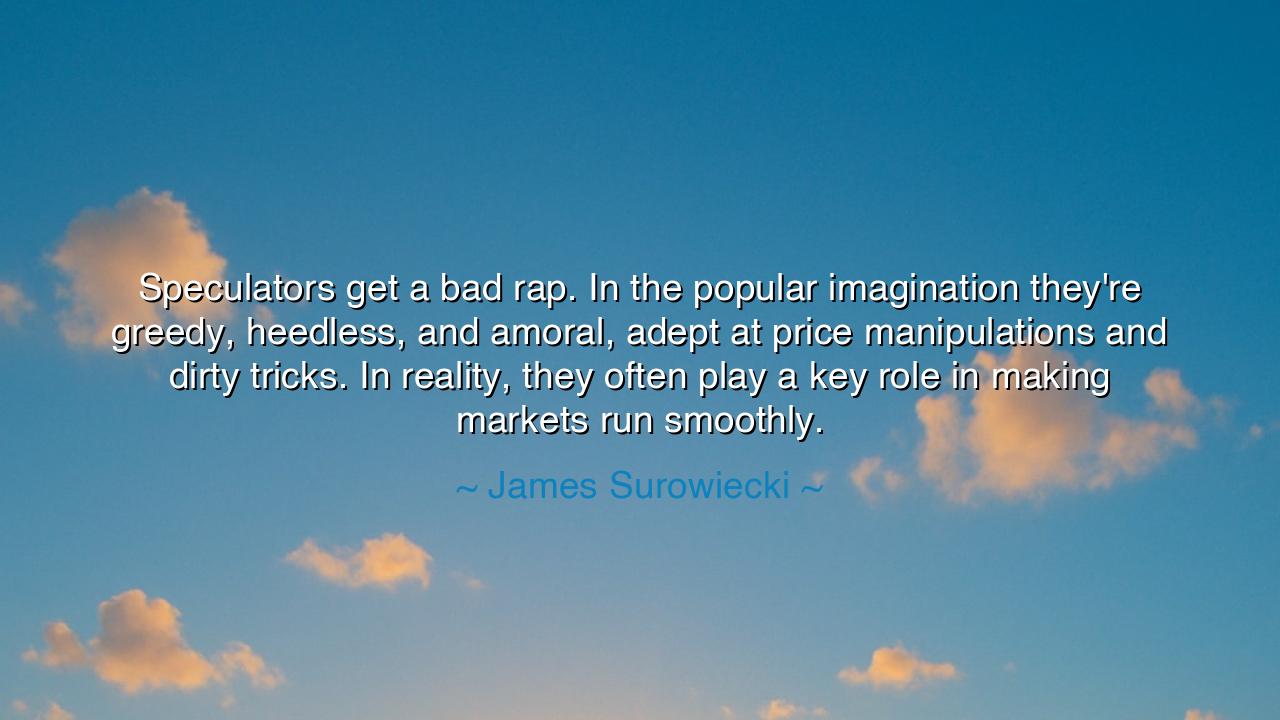
Speculators get a bad rap. In the popular imagination they're
Speculators get a bad rap. In the popular imagination they're greedy, heedless, and amoral, adept at price manipulations and dirty tricks. In reality, they often play a key role in making markets run smoothly.






O children of the earth, gather close, for in the words of James Surowiecki lies a reflection on the nature of speculators and their role in the market, a role that has often been misunderstood by the masses. He said, "Speculators get a bad rap. In the popular imagination they're greedy, heedless, and amoral, adept at price manipulations and dirty tricks. In reality, they often play a key role in making markets run smoothly." These words urge us to look beyond the surface and understand the deeper function of speculators in the grand economy, for they are not mere villains but players in a complex and necessary game, whose actions may, at times, serve the greater good.
Speculation, O children, is often viewed through the lens of greed—the desire to gain wealth without labor, to manipulate the system for personal benefit. The word itself often carries a negative connotation, evoking images of unscrupulous individuals who profit from the suffering of others. Yet, Surowiecki calls upon us to see speculators as more than just the caricatures drawn by popular imagination. In truth, they often play a vital role in markets, helping to stabilize them and ensure their efficiency. Like the wind that moves the seas, their influence helps the market to flow, keeping it from stagnating, guiding the movement of goods, services, and investments.
Consider, O children, the great traders of the ancient world—those who navigated the seas in search of spices, silk, and precious metals. The Phoenicians and later the Romans, in their vast trade networks, were not simply merchants; they were also speculators, predicting and managing the prices of the goods they carried. Though they were often vilified by those who envied their wealth, their risk-taking and predictions helped ensure the smooth flow of trade across the ancient world. Without their speculation, the world’s economies would have been far less interconnected, and the great empires of the ancient world would not have flourished as they did.
Speculators are not driven solely by greed; they are often motivated by a keen sense of market forces, anticipating changes in supply and demand before they occur. Their ability to predict market fluctuations—though sometimes seen as underhanded—is, in reality, a skill that helps the economy adjust to changes, keeping it flexible and dynamic. In times of crisis, speculators may be the very ones who step in to stabilize the market, buying up goods when others are panicked and selling them when the storm has passed. In doing so, they create the conditions for recovery, even if their actions are not always celebrated in the moment.
Think, O children, of the great financial crash of 2008, when the global economy teetered on the brink of collapse. While many blamed the speculators for their part in the crisis, others saw that their actions, though risky, had a certain logic to them. Risk-takers and market makers, in their buying and selling, had been attempting to stabilize the market in their own way. Though their judgment was often clouded by greed, the fundamental mechanisms they employed—anticipating risk, managing uncertainty, and ensuring liquidity—are what allow economies to grow, to expand, and to recover after periods of hardship.
The lesson, O children, is that the market is not an inherently evil entity but a complex system where many forces play their parts. Speculators, often misunderstood, help the market function by predicting, investing, and stabilizing prices. They take risks, but their actions often ensure that the economy remains fluid and efficient, even when the storms of uncertainty are upon us. They are not the villains they are often made out to be, but rather the catalysts of change, the ones who, by taking a step into the unknown, ensure that the rest of the world can move forward.
So, O children, the lesson is to view the world of the market with clear eyes. Understand that speculation is an essential part of the system, just as risk and reward are intertwined in every great venture. Do not demonize those who take chances but recognize the complexity of their role. Like the ancient traders, the modern speculators play a necessary part in the dance of the economy, ensuring that the wheel of commerce keeps turning. Risk-taking may seem dangerous, but it is often the key to progress, to growth, and to resilience in the face of challenges.
Act with wisdom, O children, and understand that the world is not divided into clear lines of good and evil. Instead, it is shaped by forces both visible and invisible, all of which contribute to the great tapestry of life. As you grow and make your way in the world, remember that markets—like societies—are not just governed by the powerful or the privileged, but by the collective actions of all players, from the humble to the speculative.






AAdministratorAdministrator
Welcome, honored guests. Please leave a comment, we will respond soon